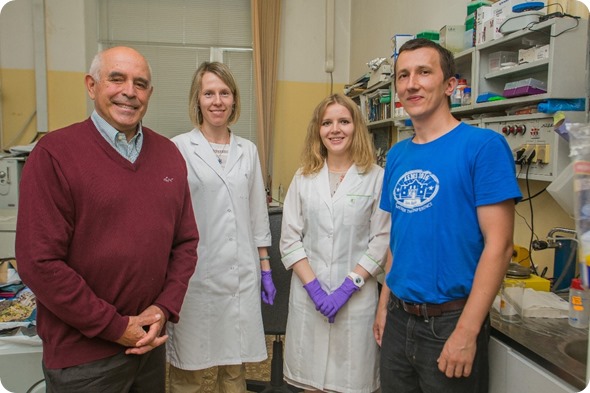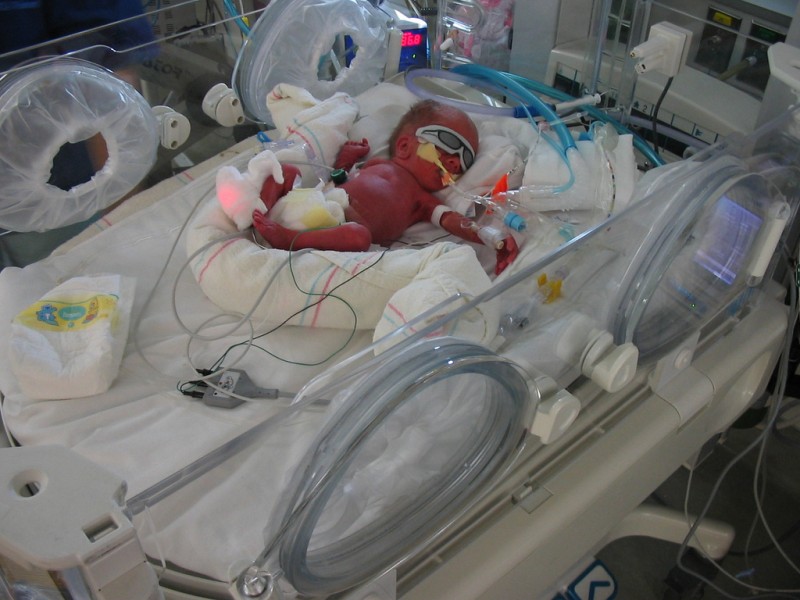An interview with Skoltech Professor Evgeny Nikolaev, conducted by April Cashin-Garbutt, MA (Cantab), originally published on news-medical.net.
Which respiratory pathologies are preterm newborns at risk of, and how have these conditions traditionally been tested for?
The majority of patients in neonatal intensive care units are premature babies, who often have infectious (congenital pneumonia) or noninfectious (tachypnea, infant respiratory distress syndrome) respiratory pathologies.
Routine clinical and laboratory tests are not always good for fast and accurate identification of pathogens. Also, the invasiveness of examination and therapy methods is a serious problem for the intensive care and nursing of premature infants.

Left to right – Head of team Prof. Evgeny Nikovaev, Anna Bugrova, Olga Kechko, senior fellow Alexey Kononikhin
Why is it important to determine whether an infection or a failure in the development process is the underlying cause of the illness?
Identifying the cause of respiratory pathologies in preterm infants and providing them with the adequate treatment is crucial for nursing them back to health.
In particular, it is important to differentiate between the infectious and the noninfectious respiratory disorders, since the former require antibiotic treatment.
What sparked your research into the possibility of using urine samples for diagnosis?
Urine is a desirable material for the study and diagnostics of diseases. The urinary proteome of adults has been studied for more than 30 years, but studies of the urinary proteome in pediatrics, especially in neonatology, are limited.
It is worth noting that, to the best of our knowledge the urine proteome during the first week of life of premature infants with respiratory pathologies of infectious and noninfectious origin was not yet investigated.
How much information can be gained from the urinary proteome?
Urine contains proteins that are readily detectable in all studied individuals (adults, children, infants), also known as the core urine proteome, and infant-specific and disease-specific proteins.
In order to further specify the defined infant-specific dataset, the proteins were compared with the urinary proteome of healthy adults (men and pregnant women).
Which techniques did you use to determine whether respiratory pathologies were infectious or noninfectious?
Here we apply liquid chromatography coupled with high accuracy mass spectrometry to study the urine proteome of preterm neonates with respiratory disorders of infectious (pneumonia) and noninfectious (apnea, transient tachypnea, respiratory distress syndrome) origins.
Label-free proteomic data was compared for preterm neonates with respiratory disorders against term healthy newborns (control) and healthy adults (men and women) with the aim of defining the urine proteins that are disease-specific.
Why have studies of the urinary proteome in pediatrics, and in particular neonatology, been limited in the past?
New technologies are currently being developed rapidly and implemented at the clinic, including its newly established labs.
The major setback for the research of that kind, promising as it may be, has to do with the ethical issues. Nevertheless, a few studies were performed, and potential biomarkers in the urine samples of infants were demonstrated for predicting such pathologies as obstructive nephropathy and necrotizing enterocolitis and for monitoring the development of the urinary system.
What impact do you think this research will have?
In our pilot study, we succeeded in defining the core urinary proteome and the proteins that are specific to infants and pathological conditions. We are pioneers in the noninvasive identification of urinary biomarkers diagnosing respiratory conditions in newborns. The results are optimistic and will serve as a platform to move forward in developing a method of monitoring conditions in newborns.
What are the next steps for your research?
Verification of our results requires further research with a bigger sampling group and the inclusion of additional comparison groups to assess the specificity and diagnostic value of the presented panel of proteins.
Where can readers find more information?
The findings have been published in the Journal of Proteomics.
